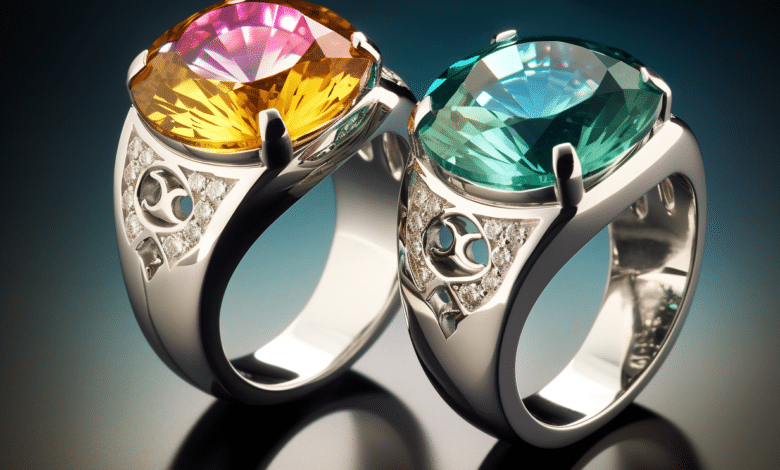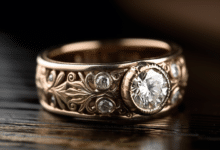7 Critical Factors in Choosing Durable Ring Materials

When it comes to choosing a ring, durability is one of the most crucial factors to consider. After all, a ring symbolizes a lifetime commitment, and it should be able to withstand the test of time and everyday wear. Whether you’re selecting an engagement ring, a wedding band, or a statement piece for your jewelry collection, the materials you choose can significantly impact the longevity and resilience of your ring. In this article, we’ll delve into the seven critical factors to consider when choosing durable ring materials, ensuring that your precious investment remains a timeless treasure.





When choosing a ring, durability is key. It should be able to endure daily use and symbolize a lifetime commitment. The materials you select greatly impact its longevity. Whether it’s an engagement ring, wedding band, or statement piece, consider these seven factors for a durable ring that remains a timeless treasure.
1. Understanding Metal Hardness
The hardness of a metal is a measure of its resistance to scratching, denting, and deformation. Harder metals are generally more durable and less prone to damage from everyday wear and tear. Some of the hardest and most durable metals used in jewelry include:
- Platinum: With a hardness rating of 4-4.5 on the Mohs scale, platinum is one of the most durable and long-lasting metals used in jewelry. It is highly resistant to scratches, dents, and tarnishing, making it an excellent choice for rings that will be worn daily.
- White Gold: When alloyed with metals like palladium or nickel, white gold can achieve a hardness rating of around 3.5-4 on the Mohs scale, making it a durable option for rings.
- Tungsten Carbide: Known for its exceptional hardness (ranking 9-9.5 on the Mohs scale), tungsten carbide is an incredibly durable and scratch-resistant material suitable for men’s rings and contemporary designs.
2. Exploring Metal Durability
While hardness is an important factor in determining a metal’s durability, it’s not the only consideration. The overall strength and resistance to bending, breaking, and deformation also play a significant role. Here are some metals known for their strength and durability:
- Titanium: Lightweight yet incredibly strong, titanium is highly resistant to corrosion and scratches, making it an excellent choice for active lifestyles or those who work with their hands.
- Cobalt Chrome: This hard and durable metal alloy is often used in industrial and medical applications due to its resistance to wear and corrosion, making it a popular choice for men’s rings.
- Stainless Steel: While not as hard as some precious metals, stainless steel is incredibly strong, durable, and resistant to scratches, making it a budget-friendly option for everyday wear.
3. Gemstone Durability and Hardness
When selecting a ring with gemstones, it’s essential to consider the hardness and durability of the stones. Harder gemstones are less likely to chip, crack, or become dull over time. Some of the most durable gemstones for rings include:
- Diamonds: With a hardness rating of 10 on the Mohs scale, diamonds are the hardest known natural material, making them incredibly resistant to scratches and abrasions.
- Sapphires and Rubies: Both sapphires and rubies rank 9 on the Mohs scale, making them highly durable and suitable for everyday wear.
- Emeralds: While not as hard as diamonds or sapphires, emeralds have a hardness rating of 7.5-8 on the Mohs scale, making them a relatively durable choice for rings when properly cared for.
4. Choosing the Right Ring Setting
The type of ring setting you choose can also significantly impact the durability of your ring. A well-designed setting can protect the gemstones from potential damage and ensure they stay securely in place. Some of the most durable ring settings include:
- Bezel Setting: In this setting, a metal rim surrounds the gemstone, offering excellent protection against chips, scratches, and accidental knocks.
- Prong Setting: While more delicate than a bezel setting, a sturdy prong setting with thick, well-crafted prongs can provide ample protection for the gemstones.
- Channel Setting: This setting features a continuous row of gemstones secured in a metal channel, providing excellent protection and durability.
5. Maintenance and Proper Care
Even the most durable materials can succumb to wear and tear if not properly cared for. Regular maintenance and proper care are crucial for preserving the longevity of your ring. Here are some tips to keep in mind:
- Remove your ring before engaging in activities that could potentially damage it, such as manual labor, sports, or household chores.
- Clean your ring regularly with a soft-bristled brush and mild soap and water to remove dirt and debris that can cause abrasions.
- Have your ring professionally inspected and cleaned at least once a year to ensure the integrity of the setting and the security of the gemstones.
- Store your ring in a safe, padded container when not in use to prevent scratches and damage.
6. Consider Your Lifestyle
Your lifestyle and daily activities should play a significant role in determining the materials and design of your ring. If you have an active lifestyle or work in an environment that could potentially damage your ring, it’s essential to choose more durable materials and settings. For example, a bezel-set ring with a harder metal like platinum or tungsten carbide may be a better choice for those with more physically demanding lifestyles.
7. Quality and Craftsmanship
While the materials used in a ring are crucial for durability, the quality of craftsmanship is equally important. A well-made ring from a reputable jeweler will not only be more durable but will also maintain its beauty and integrity for years to come. Look for rings crafted by skilled artisans using high-quality materials and attention to detail.
By considering these seven critical factors, you can make an informed decision when choosing durable ring materials, ensuring that your precious jewelry remains a cherished possession for generations to come. Remember, a ring is not just an accessory; it’s a symbol of love, commitment, and lasting memories, and investing in quality and durability is an investment in preserving those timeless sentiments.












